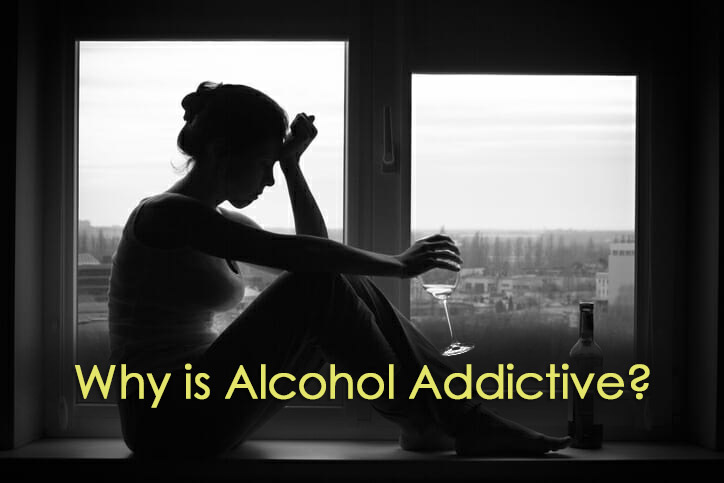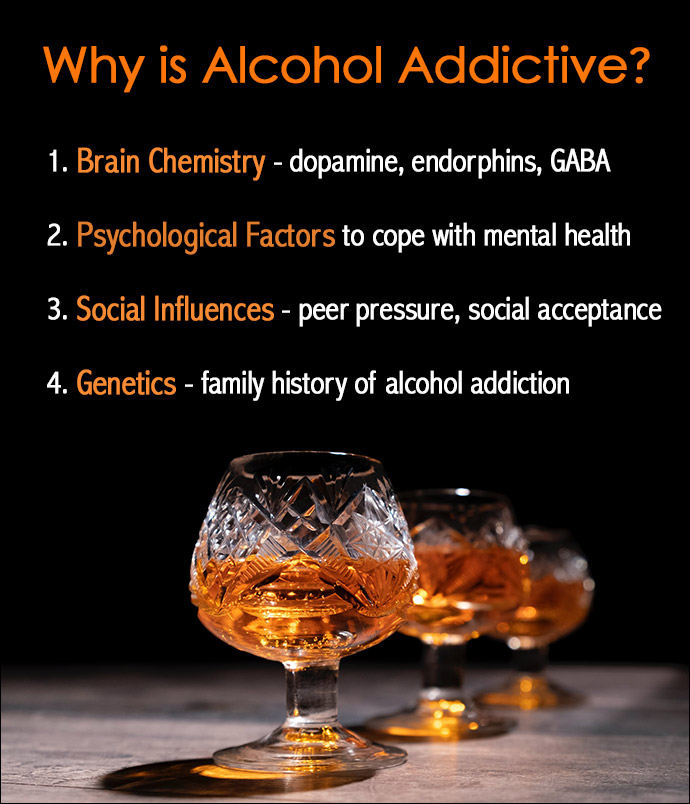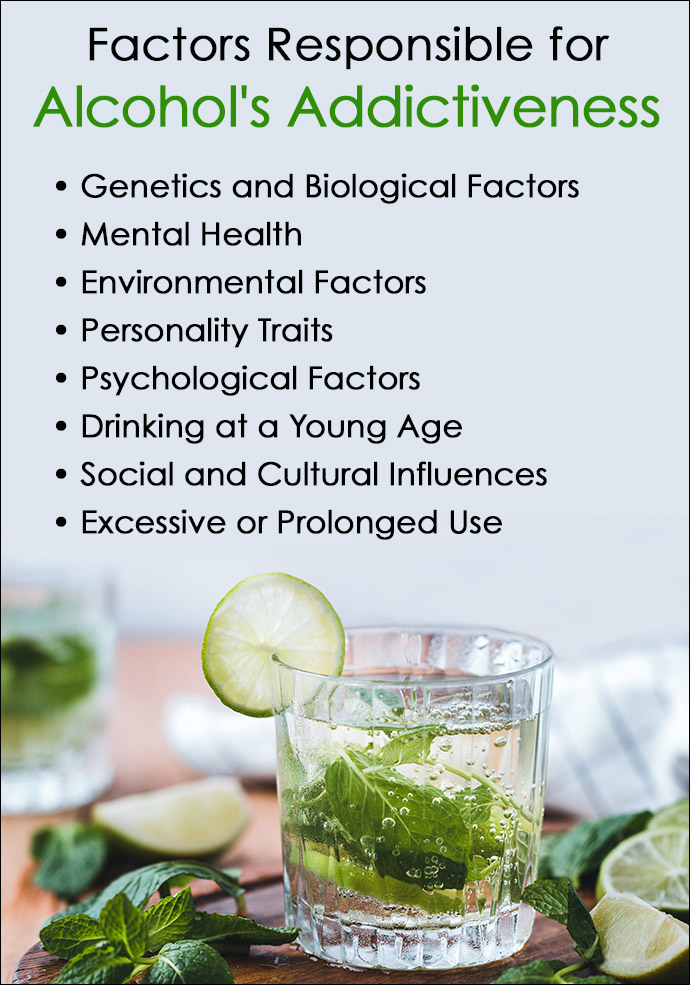Alcohol is one of the most popular substances around the world and it is consumed at weddings, parties, and in homes. Alcohol helps people feel more relaxed and less stressed. Despite its popularity, many wonder if it is addictive, and if so, why is alcohol addictive?
It’s hard for many people to imagine how something as widely used and socially accepted as alcohol can be harmful.
Why do some individuals enjoy drinking without any issues, while others lose control and struggle with the negative effects of alcohol?
To answer these questions, it’s necessary to have a better understanding of the addictive nature of alcohol.
Is Alcohol Addictive?
Yes, alcohol is addictive. Anytime you consume an alcoholic beverage, there is a chance of experiencing negative side effects. And if you drink alcohol regularly, you are at risk of addiction.
Alcohol addiction is commonly referred to as alcoholism, although the medical term is known as Alcohol Use Disorder.
According to the National Institute on Alcohol Abuse and Alcoholism (NIAAA), alcohol use disorder is a chronic relapsing brain disorder and spectrum medical condition that ranges from mild to severe.
Alcohol addiction leads to compulsive use and the inability to manage or stop using alcohol despite negative health and social consequences.
Why is Alcohol Addictive?
There are numerous factors that contribute to the addictive nature of alcohol. Some are physiological and others are psychological.
- Brain Chemistry related to changes with dopamine, endorphins, and GABA
- Psychological Factors of using alcohol to cope with mental health issues like anxiety and depression
- Social Influences such as peer pressure and social acceptance
- Genetics and a family history of alcohol dependence and addiction
It’s important to understand the risks and causes of addiction in order to drink responsibly or to know when to stop.
Much of the addictive nature of alcohol is due to the powerful affect it has on the brain’s reward system.
Alcohol promotes the release of chemical neurotransmitters in the brain associated with pleasure.
When an individual drinks alcohol, it increases production of endorphins and dopamine and produces a pleasurable experience.
Alcohol also affects other neurotransmitters like gamma-aminobutyric acid (GABA), that induce a calm and relaxing effect that is also satisfying.
Over time, the brain associates alcohol with these positive feelings and begins to crave them and it starts a vicious cycle.
After heavy or prolonged alcohol use, the brain stops producing the feel-good chemicals naturally and relies on alcohol to activate them.
This changes the structure and function of the brain and a person builds a tolerance and requires more alcohol to feel normal or happy.
In addition, if a person develops a physical dependence and tries to stop drinking, it causes uncomfortable withdrawal symptoms that require alcohol detox to safely avoid and overcome.
Many people will continue using alcohol simply to avoid the symptoms of withdrawal.
Is Alcohol Addictive Compared to Other Substances?
Alcohol is one of the most used addictive substances in the world and is legal and socially accepted in almost all places around the globe.
Even though it’s difficult to compare addictive substances to each other, alcohol is certainly considered one of the most addictive drugs, and one of the most harmful.
A 2019 survey of addiction experts ranked alcohol as the 5th most addictive drug behind heroin, cocaine, nicotine, and barbiturates, although they ranked alcohol as the most damaging drug.
It’s estimated that over 178,000 people die from alcohol use each year in the United States, and it is one of the leading causes of preventable death.
An Australian drug harms study in 2019 ranked alcohol as the most harmful substance overall, ahead of cigarettes, methamphetamine, cannabis, heroin, and pharmaceutical opioids.
Why Do People Get Addicted to Alcohol?
It’s easy to understand why alcohol is addictive when considering the affects it has on the brain’s pleasure and reward system.
There is no single reason people get addicted to alcohol, and it is usually a combination of genetic, psychological, social, and environment factors.
Factors Responsible for Alcohol’s Addictiveness
- Genetics and Biological Factors
- Mental Health
- Environmental Factors
- Personality Traits
- Psychological Factors
- Drinking at a Young Age
- Social and Cultural Influences
- Excessive or Prolonged Use
1. Genetics and Biological Factors
Genetics plays a significant role in developing an addiction to alcohol. When an individual has a close family member with an alcohol dependence issue, it can increase their risk of developing the same condition.
2. Mental Health
It’s common for people to use alcohol to cope with mental health issues like anxiety, depression, or PTSD. Alcohol may help ease the symptoms temporarily, but over time it often makes them worse.
3. Environmental Factors
Environmental influences, like growing up in a household where alcohol use is prevalent can increase the risk of alcoholism. Social pressure, socioeconomic status, and the need to fit in with peers all have an impact.
4. Personality Traits
Low self-esteem and having an impulsive personality can contribute to alcohol use and addiction.
5. Psychological Factors
Developing a psychological dependence to alcohol or cognitive impairment due to changes in the brain can lead to alcohol addiction.
6. Drinking at a Young Age
Exposure to drinking alcohol at an early age when the brain is still developing often leads to continued drinking into adulthood and leads to addiction.
7. Social and Cultural Influences
Alcohol use is ubiquitous in movies, television, and the media as a way to relax and fit in socially with others. It is accepted as a normal part of life, often without consequences.
8. Excessive or Prolonged Use
Chronic, heavy, or long-term alcohol use causes a tolerance and dependence that requires a person to continue drinking just to feel normal or happy. This is one of the biggest reasons people get addicted to alcohol.
The details outlined here illustrate that alcohol is a harmful and highly addictive substance. Its impact on brain functioning make it one of the most difficult addictions to overcome.
With effective evidence-based treatment though, it’s possible to overcome the effects and maintain a lifelong recovery.
Alcohol Addiction Help from Summit Malibu
If you or someone you care about is addicted to alcohol, the best course of action is to get help from a professional alcohol treatment program.
Combining therapy and assistance from trained medical professionals offers the most successful recovery plan and can be safer and more effective than trying to get sober alone.
Contact Summit Malibu for more information about why is alcohol addictive and how we can help you or someone you care about. We accept most insurance carriers and will let you know what is covered through your provider.






